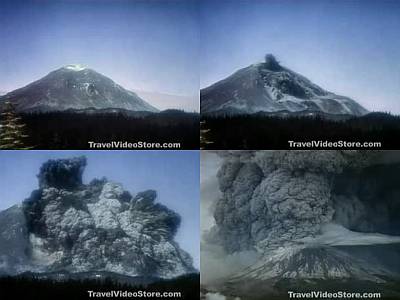Why does it make a sound like a laser gun when ice is dropped into a hole about 140m deep?

When a block of ice is dropped into a hole 450 feet (approximately 137 m) deep in the Antarctic ice sheet, a movie that sounds like a sci-fi laser gun firing 'Bishun!' has become a hot topic on Twitter. I did. Science media Science Alert explains why a hole in the ice makes a sound that sounds like it was made by an electronic musical instrument.
Weird Video of Scientists Dropping Ice Down a Super Deep Hole Is Totally Mesmerising
https://www.sciencealert.com/here-s-why-ice-falling-down-a-450-foot-hole-makes-this-super-weird-noise
Below is a movie released on Twitter by isotope geochemist John Andrew Higgins .
What does a 9 inch ice core sound like when dropped down a 450 foot hole? Like this! Credit to @peter_neff for the idea and @Scripps_Polar , @sciencejenna , @GeosciencesPU , @US_IceDrilling , and @paleosurface for the execution! pic.twitter .com/pW7LxKdbUB
— John Andrew Higgins (@blueicehiggins) February 7, 2020
In addition, a movie released by glaciologist Peter Neff in which he drops ice into a hole 295 feet (approximately 90 m) deep has been viewed more than 10 million times at the time of writing, and received more than 30,000 likes. I am. In this movie, in addition to the sound 'Bishun!', you can clearly see that the sound 'Don... Don...', which is like a heartbeat, resonates near the end of the movie.
????????Sound ON????????
— Peter Neff (@peter_neff) February 28, 2018
When #science is done, it's fun to drop ice down a 90 m deep borehole in an #Antarctic ???????? #glacier ❄️. So satisfying when it hits the bottom.
Happy hump day. pic.twitter.com/dQtLPWQi7T
Since a block of ice is dropped into a hole in the ice, you should normally hear a sound like a 'gun' hitting something hard. However, Mr. Neff points out that the `` Doppler effect '' is one of the reasons why the sound like ``bishun'' sounds like a laser beam made by a synthesizer.
The Doppler effect is a phenomenon in which the frequency of waves such as sound or light changes when the source of the wave or the observer moves. For example, one of the most famous examples of the Doppler effect is ``When an ambulance passes by, you hear a low siren sound'' as shown in the movie below. Mr. Neff claims that the sound waves whose frequency has changed due to the Doppler effect come out of a narrow hole, causing a sound like 'bishun' to be heard. When you look at the movie that actually drops the ice, the pitch heard from the hole is getting lower little by little.
Doppler Effect 1 PowerShot SX230 HS - YouTube
'When the ice hits the bottom of the hole, the sound doesn't just go straight up, it starts bouncing off the sides of the hole, so you get that heartbeat-like sound afterwards,' Neff says. The sound echoes in a hole tens of meters deep and overlaps, resulting in the final sound of 'Don... Don...'.
In addition, Mr. Neff said in an interview with the University of Washington that he dug a 90m hole into the Antarctic ice sheet ``to investigate the atmospheric composition about 150 years ago.''
Related Posts:







